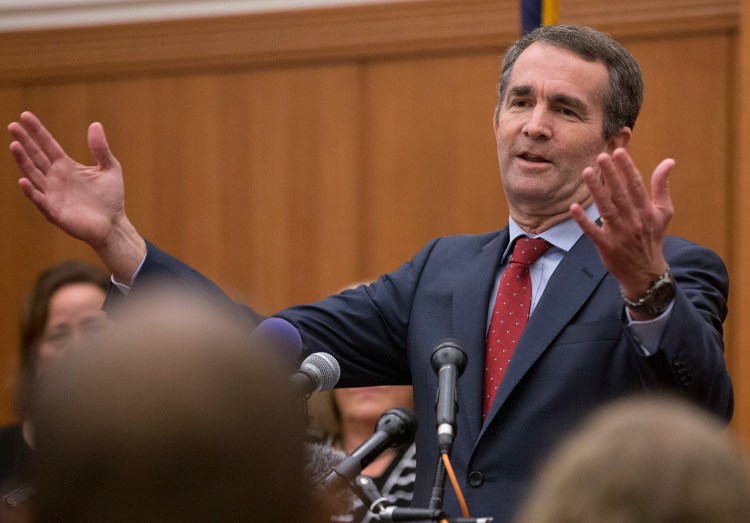WASHINGTON – Emboldened by election wins, Democrats are starting to see a political edge in health care, particularly widening Medicaid access for more low-income people.
In Virginia, Democrat Ralph Northam promised a vigorous push as governor to expand Medicaid. Voters who said health care was important went decisively for Northam, according to political analysts. In Maine, voters defied Republican Gov. Paul LePage’s determined opposition by passing a referendum to expand Medicaid to cover an estimated 70,000 more residents.
“Democratic voters have a lot of reasons they are angry at President Trump and Republicans in Congress,” said Republican pollster Bill McInturff. “These voters are intensely focused on wanting to see health care coverage expanded, not cut back, and efforts to repeal and replace the Affordable Care Act have contributed to their intensity and turnout.”
During Barack Obama’s presidency, health care was often seen as a political liability for Democrats. In 2010, they lost their House majority following the bitter battle to pass the ACA with no Republican support. In 2014, Democrats gave up the Senate a year after the Obama administration fumbled the rollout of HealthCare.gov. And candidate Donald Trump seized on rising “Obamacare” premiums as part of his closing argument in the 2016 presidential campaign.
But public opinion seems to have shifted amid widespread opposition to Trump-backed “repeal and replace” bills that would have left millions uninsured and made it harder for people with pre-existing health problems to get coverage. The Republican bills not only would have repealed the ACA’s Medicaid expansion, but also would have limited future federal financing for the entire program, even prompting opposition from some Republican governors.
“I think health care is a driving motivator for Democrats to elect people who will not take it away,” Sen. Patty Murray of Washington, ranking Democrat on the Senate health committee, said Wednesday. “What’s happened in the past six months is that Medicaid went from a hidden thing to something everyone has heard about. Before, nobody said, ‘I’m on Medicaid.’ Now we know it’s our next-door neighbor.”
Medicaid is a federal-state health program that covers about 75 million Americans, or about 1 in 5. Beneficiaries include elderly nursing home residents, severely disabled people of any age, and many newborns and pregnant women. Under the ACA, it was expanded to cover more low-income adults, who in many cases work jobs that don’t provide health insurance.
Before Maine’s vote, 31 states and Washington, D.C., had expanded Medicaid under ACA. Now Maine-style referendum campaigns are planned in at least three states – Alaska, Idaho and Utah. In Alaska, which has expanded Medicaid, voters will be asked if they want to preserve the expansion even if Washington decides to roll back federal financing.
Medicaid expansion has the support of the hospital industry and the medical community, influential interest groups in just about every state.
“I honestly believe that if you had a referendum on expanding Medicaid in most of the states that don’t have it, it would win,” said Rep. Frank Pallone of New Jersey, the senior Democrat on the House committee that oversees the program. “People know the value of Medicaid in a way that they didn’t before.”
Polling expert Robert Blendon says what’s changing is not so much that Americans have suddenly fallen for “Obamacare,” but that there’s a growing belief that government does have a responsibility to make coverage available and affordable.
“The Obamacare weapon was great for Republicans until you debated what the Republican alternative was,” said Blendon, who teaches at the Harvard T.H. Chan School of Public Health. “The alternative can’t be dropping people and taking away protection for pre-existing conditions.”
Using Medicaid to cover low-wage workers is popular with the public, he added, at a time when many jobs don’t come with benefits once considered standard. Separately, studies have shown that Medicaid coverage is associated with fewer financial problems and better emotional health.
The Trump administration seems to be moving in a different direction, however.
In an Election Day speech to state Medicaid officials, the top administration official overseeing the program took issue with Medicaid expansion.
“The thought that a program designed for our most vulnerable citizens should be used a vehicle to serve working age, able-bodied adults does not make sense,” Seema Verma, head of the Centers for Medicare and Medicaid Services, said Tuesday.
Verma said the goal should be to help working-age adults “move up, move on, and move out,” underscoring the administration’s willingness to approve state requests for work requirements for Medicaid beneficiaries.
“We shouldn’t just celebrate an increase in the rolls, or more Medicaid cards handed out,” she said.
Associated Press writer Patrick Whittle in Portland, Maine, contributed to this report.
Send questions/comments to the editors.



Comments are no longer available on this story